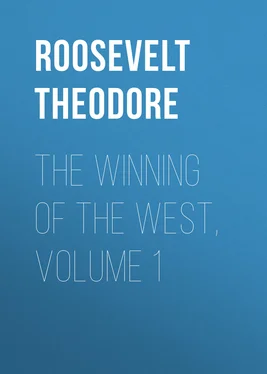Theodore Roosevelt - The Winning of the West, Volume 1
Здесь есть возможность читать онлайн «Theodore Roosevelt - The Winning of the West, Volume 1» — ознакомительный отрывок электронной книги совершенно бесплатно, а после прочтения отрывка купить полную версию. В некоторых случаях можно слушать аудио, скачать через торрент в формате fb2 и присутствует краткое содержание. Жанр: foreign_prose, История, foreign_edu, foreign_antique, на английском языке. Описание произведения, (предисловие) а так же отзывы посетителей доступны на портале библиотеки ЛибКат.
- Название:The Winning of the West, Volume 1
- Автор:
- Жанр:
- Год:неизвестен
- ISBN:нет данных
- Рейтинг книги:5 / 5. Голосов: 1
-
Избранное:Добавить в избранное
- Отзывы:
-
Ваша оценка:
- 100
- 1
- 2
- 3
- 4
- 5
The Winning of the West, Volume 1: краткое содержание, описание и аннотация
Предлагаем к чтению аннотацию, описание, краткое содержание или предисловие (зависит от того, что написал сам автор книги «The Winning of the West, Volume 1»). Если вы не нашли необходимую информацию о книге — напишите в комментариях, мы постараемся отыскать её.
The Winning of the West, Volume 1 — читать онлайн ознакомительный отрывок
Ниже представлен текст книги, разбитый по страницам. Система сохранения места последней прочитанной страницы, позволяет с удобством читать онлайн бесплатно книгу «The Winning of the West, Volume 1», без необходимости каждый раз заново искать на чём Вы остановились. Поставьте закладку, и сможете в любой момент перейти на страницу, на которой закончили чтение.
Интервал:
Закладка:
Australia, which was much less important than America, was also won and settled with far less difficulty. The natives were so few in number and of such a low type, that they practically offered no resistance at all, being but little more hindrance than an equal number of ferocious beasts. There was no rivalry whatever by any European power, because the actual settlement—not the mere expatriation of convicts—only began when England, as a result of her struggle with Republican and Imperial France, had won the absolute control of the seas. Unknown to themselves, Nelson and his fellow admirals settled the fate of Australia, upon which they probably never wasted a thought. Trafalgar decided much more than the mere question whether Great Britain should temporarily share the fate that so soon befell Prussia; for in all probability it decided the destiny of the island-continent that lay in the South Seas.
The history of the English-speaking race in America has been widely different. In Australia there was no fighting whatever, whether with natives or with other foreigners. In America for the past two centuries and a half there has been a constant succession of contests with powerful and warlike native tribes, with rival European nations, and with American nations of European origin. But even in America there have been wide differences in the way the work has had to be done in different parts of the country, since the close of the great colonial contests between England, France, and Spain.
The extension of the English westward through Canada since the war of the Revolution has been in its essential features merely a less important repetition of what has gone on in the northern United States. The gold miner, the transcontinental railway, and the soldier have been the pioneers of civilization. The chief point of difference, which was but small, arose from the fact that the whole of western Canada was for a long time under the control of the most powerful of all the fur companies, in whose employ were very many French voyageurs and coureurs des bois. From these there sprang up in the valleys of the Red River and the Saskatchewan a singular race of half-breeds, with a unique semi-civilization of their own. It was with these half-breeds, and not, as in the United States, with the Indians, that the settlers of northwestern Canada had their main difficulties.
In what now forms the United States, taking the country as a whole, the foes who had to be met and overcome were very much more formidable. The ground had to be not only settled but conquered, sometimes at the expense of the natives, often at the expense of rival European races. As already pointed out the Indians themselves formed one of the main factors in deciding the fate of the continent. They were never able in the end to avert the white conquest, but they could often delay its advance for a long spell of years. The Iroquois, for instance, held their own against all comers for two centuries. Many other tribes stayed for a time the oncoming white flood, or even drove it back; in Maine the settlers were for a hundred years confined to a narrow strip of sea-coast. Against the Spaniards, there were even here and there Indian nations who definitely recovered the ground they had lost.
When the whites first landed, the superiority and, above all, the novelty of their arms gave them a very great advantage. But the Indians soon became accustomed to the new-comers' weapons and style of warfare. By the time the English had consolidated the Atlantic colonies under their rule, the Indians had become what they have remained ever since, the most formidable savage foes ever encountered by colonists of European stock. Relatively to their numbers, they have shown themselves far more to be dreaded than the Zulus or even the Maoris.
Their presence has caused the process of settlement to go on at unequal rates of speed in different places; the flood has been hemmed in at one point, or has been forced to flow round an island of native population at another. Had the Indians been as helpless as the native Australians were, the continent of North America would have had an altogether different history. It would not only have been settled far more rapidly, but also on very different lines. Not only have the red men themselves kept back the settlements, but they have also had a very great effect upon the outcome of the struggles between the different intrusive European peoples. Had the original inhabitants of the Mississippi valley been as numerous and unwarlike as the Aztecs, de Soto would have repeated the work of Cortes, and we would very possibly have been barred out of the greater portion of our present domain. Had it not been for their Indian allies, it would have been impossible for the French to prolong, as they did, their struggle with their much more numerous English neighbors.
The Indians have shrunk back before our advance only after fierce and dogged resistance. They were never numerous in the land, but exactly what their numbers were when the whites first appeared is impossible to tell. Probably an estimate of half a million for those within the limits of the present United States is not far wrong; but in any such calculation there is of necessity a large element of mere rough guess-work. Formerly writers greatly over-estimated their original numbers, counting them by millions. Now it is the fashion to go to the other extreme, and even to maintain that they have not decreased at all. This last is a theory that can only be upheld on the supposition that the whole does not consist of the sum of the parts; for whereas we can check off on our fingers the tribes that have slightly increased, we can enumerate scores that have died out almost before our eyes. Speaking broadly, they have mixed but little with the English (as distinguished from the French and Spanish) invaders. They are driven back, or die out, or retire to their own reservations; but they are not often assimilated. Still, on every frontier, there is always a certain amount of assimilation going on, much more than is commonly admitted; 1 1 To this I can testify of my own knowledge as regards Montana, Dakota, and Minnesota. The mixture usually takes place in the ranks of the population where individuals lose all trace of their ancestry after two or three generations; so it is often honestly ignored, and sometimes mention of it is suppressed, the man regarding it as a taint. But I also know many very wealthy old frontiersmen whose half-breed children are now being educated, generally at convent schools, while in the Northwestern cities I could point out some very charming men and women, in the best society, with a strain of Indian blood in their veins.
and whenever a French or Spanish community has been absorbed by the energetic Americans, a certain amount of Indian blood has been absorbed also. There seems to be a chance that in one part of our country, the Indian territory, the Indians, who are continually advancing in civilization, will remain as the ground element of the population, like the Creoles in Louisiana, or the Mexicans in New Mexico.
The Americans when they became a nation continued even more successfully the work which they had begun as citizens of the several English colonies. At the outbreak of the Revolution they still all dwelt on the seaboard, either on the coast itself or along the banks of the streams flowing into the Atlantic. When the fight at Lexington took place they had no settlements beyond the mountain chain on our western border. It had taken them over a century and a half to spread from the Atlantic to the Alleghanies. In the next three quarters of a century they spread from the Alleghanies to the Pacific. In doing this they not only dispossessed the Indian tribes, but they also won the land from its European owners. Britain had to yield the territory between the Ohio and the Great Lakes. By a purchase, of which we frankly announced that the alternative would be war, we acquired from France the vast, ill-defined region known as Louisiana. From the Spaniards, or from their descendants, we won the lands of Florida, Texas, New Mexico, and California.
Читать дальшеИнтервал:
Закладка:
Похожие книги на «The Winning of the West, Volume 1»
Представляем Вашему вниманию похожие книги на «The Winning of the West, Volume 1» списком для выбора. Мы отобрали схожую по названию и смыслу литературу в надежде предоставить читателям больше вариантов отыскать новые, интересные, ещё непрочитанные произведения.
Обсуждение, отзывы о книге «The Winning of the West, Volume 1» и просто собственные мнения читателей. Оставьте ваши комментарии, напишите, что Вы думаете о произведении, его смысле или главных героях. Укажите что конкретно понравилось, а что нет, и почему Вы так считаете.












